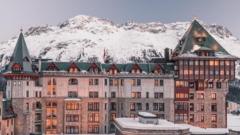While Switzerland's focus on luxury tourism aims to boost the economy via high-spending guests, the strategy raises questions about its effects on local residents and community character, particularly in alpine resorts.
Balancing Luxury and Accessibility: Switzerland's Tourism Dilemma

Balancing Luxury and Accessibility: Switzerland's Tourism Dilemma
As Switzerland lures wealthy tourists with high-end accommodations, concerns about local community impacts and affordability grow.
Switzerland is increasingly targeting the affluent tourist market, with luxury hotels designed to accommodate the world's wealthiest individuals sprouting up across the picturesque landscape. However, as global conflicts and economic uncertainties persist, the question arises: at what cost does this lavish approach come?
With the surge in the number of billionaires globally, the upscale experience has become a symbol of elite indulgence. In Switzerland, the growth of five-star hotels has outpaced other accommodation categories, reflecting a long-established reputation for sophistication and opulence. Originally built in the early 20th century to serve a new class of privilege, these hotels now offer modern luxuries, including exquisite spas, Michelin-starred dining, and ski butlers who cater to every whim of their guests – especially those arriving from key markets like the US, the Gulf states, and emerging economies in Asia.
Markus Berger from Switzerland Tourism highlights the economic necessity of attracting these high-end tourists, as they represent 25% of the total revenue, despite making up only 8% of overnight stays. The emphasis is on superior quality and exceptional service, allowing the Swiss tourism industry to thrive amidst stiff regional competition from countries boasting lower prices.
Yet, the economic model brings challenges, particularly for locals in high-end resorts such as St Moritz and Zermatt, where the rising cost of living makes it difficult for everyday residents to afford housing. Staff members in the service industry often struggle to find affordable accommodations, leading to long commutes after working late nights in elite establishments.
As Wengen, famous for its longstanding ties with British skiers, prepares to open its first five-star hotel, the community grapples with concerns about whether this shift towards luxury accommodations threatens its local charm and character. Monika Bandi from Bern University's Centre for Regional Development emphasizes the importance of maintaining a balance between quality and quantity in tourism, cautioning against reaching a tipping point where the unique essence of destinations begins to fade.
With an eye on the future, some locals express mixed feelings about the luxury trend, voicing concern that the charm of places like Wengen may be compromised. However, proponents assert that investments in tourism are vital for revitalizing previously impoverished alpine communities.
While the affluent segment of travelers remains small, Switzerland seems determined to cater to this niche. The nation’s strategy of enhancing its luxury appeal—focusing on quality rather than price—may well redefine its tourism landscape, heralding both opportunity and challenges that demand thoughtful management to ensure that local integrity is preserved amidst the allure of excess.





















